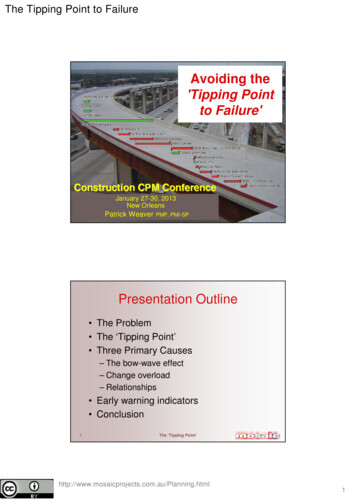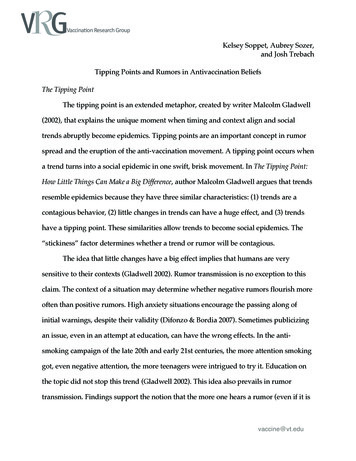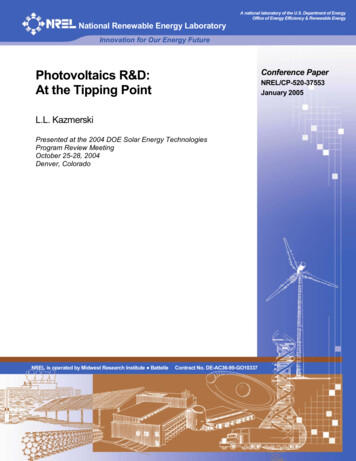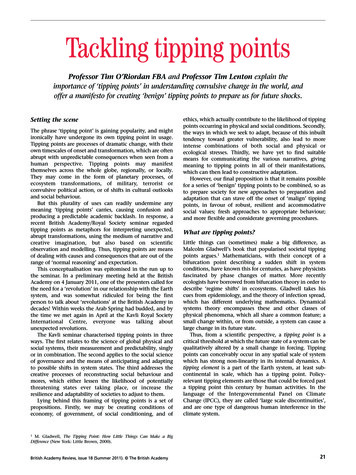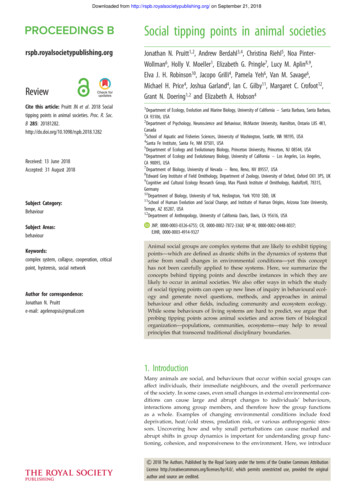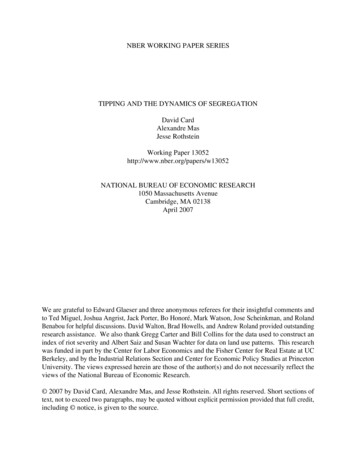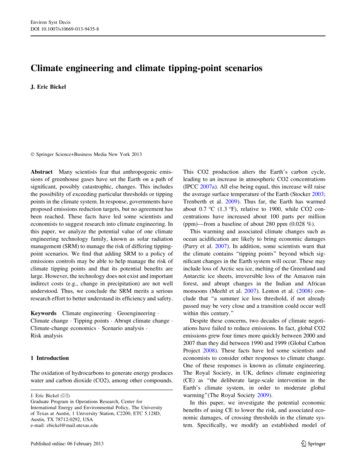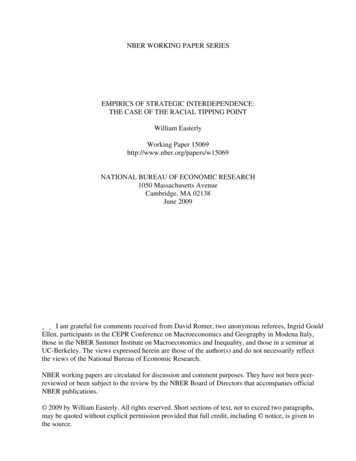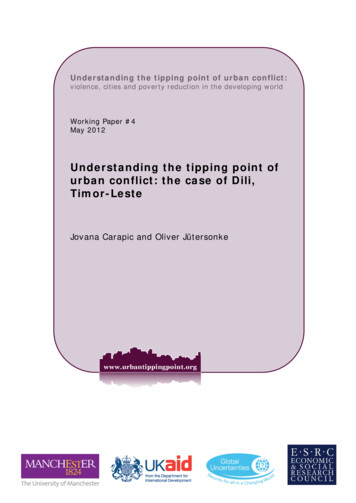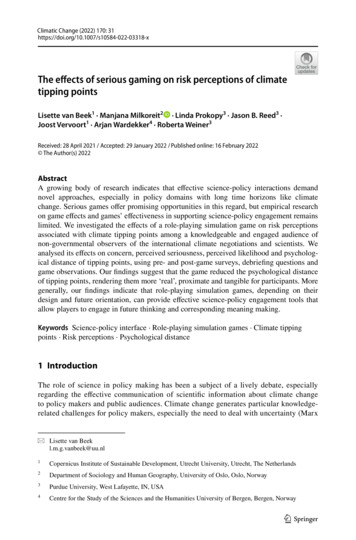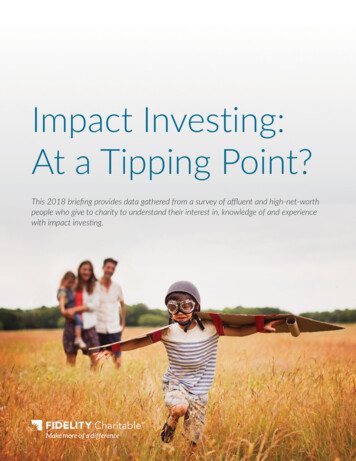
Transcription
Impact Investing:At a Tipping Point?This 2018 briefing provides data gathered from a survey of affluent and high-net-worthpeople who give to charity to understand their interest in, knowledge of and experiencewith impact investing.
Impact Investing: At a Tipping Point?Impact investing is the practice of making purposeful investments that help achieve social orenvironmental benefits—while generating financial returns. In the charitable space, impact investing hasbeen embraced by several prominent foundations, such as the Ford Foundation, as a way to ensure thatassets ultimately committed to advancing social good through grantmaking are being invested in a waythat aligns with those values.Research demonstrates younger generations have a strong desire to integrate giving back and socialchange across their personal and professional lives.1 Additionally, they perceive that the responsibilityfor making a difference is not limited to one sector but shared among a broad array of players, includingbusinesses.2 Indeed, almost 87% of Millennials believe that “the success of business should be measuredin terms of more than just its financial performance.”3At the same time, impact investing has also become much more accessible to the average consumer,with growth in options such as exchange-traded funds focused on companies that have positive socialor environmental practices. Have these shifting attitudes and growing accessibility translated into greaterknowledge and adoption of impact investing by affluent consumers? And what would it take for moreconsumers to explore this approach to values-based investing—particularly for those who are alreadydemonstrating a commitment to giving back through charitable giving? The data explored here addressesthese questions.1The Millennial Impact Project, “A Generation for Causes: A Four-Year Summary of the Millennial Impact Project,” 2014, and “Top 100 Findings from the Millennial Impact Project,” 2016.2Fidelity Charitable, “The Future of Philanthropy: Where individual giving is going,” 20163Deloitte, “The 2016 Deloitte Millennial Survey,” 20162800.682.4438 FidelityCharitable.org
Impact Investing: At a Tipping Point?Key findingsImpact investing is catching on, particularly with Generation X and Millennials.A majority of affluent Millennial (77%) and Generation X donors (72%) indicatedthat they had made some form of impact investment, such as investing in a publiclytraded company with good social or environmental practices. This compares withjust 30% of affluent donors from the Baby Boomer and older generations.Notably, most of those surveyed considered themselves to be experienced or veryexperienced investors, although investing knowledge was not a requirement ofstudy participation.The terminology of impact investing is not yet well known or understood—even by those whoare making investments that can be categorized as impact investments.Only 37% of survey respondents said they were familiar with the term impactinvesting and only 31% said they had made an impact investment prior to beingshown the list of possible ways they could do so.Millennials and Generation X have greater familiarity with the terminology thanBaby Boomers, with nearly half of both cohorts saying that they had heard of impactinvesting prior to being shown the list.3800.682.4438 FidelityCharitable.org
Impact Investing: At a Tipping Point?Basic education on impact investing and guidance from financial advisors would mostencourage investors to make an impact investment.Overall, nearly 44% cited help from a financial advisor as the factor that wouldmost encourage them to make an impact investment. Similarly, 42% cited havingmore information about impact investing. Another 42% said that having access toinvestments that have a track record of strong financial returns as well as social orenvironmental results.For the most experienced investors, having access to impact investments with atrack record of strong financial returns and easy ways to invest in low-cost funds orprivate investments were most important—perhaps unsurprising in a field that is stillgrowing and changing rapidly.Investors would consider making impact investments with assets set aside for retirement,for charitable giving or for other purposes.Investors appear equally willing to try impact investing regardless of whether theassets used are ultimately intended for retirement, for charitable giving or for otherpurposes. For each category of asset, roughly 85% of respondents indicated theyhad at least some interest in making an impact investment.Among Millennials and Generation X, nearly half of respondents indicated that theywere very or extremely interested in making impact investments with assets setaside in each of these categories.Investors are interested in both simple and sophisticated options for impact investing.Investors were most interested in investing in public companies with goodenvironmental or social practices, either by investing directly (58%) or throughexchange-traded funds or mutual funds (56%).However, they also indicated a strong interest in investing in small businesses orstart-ups with strong social or environmental practices (48%), venture capital orprivate funds focused on this category (45%) and in making loans to charitableorganizations (42%).4800.682.4438 FidelityCharitable.org
Impact Investing: At a Tipping Point?There is an opportunity for financial advisors to initiate a conversation about impact investingand provide much needed and valued expertise.Among investors with financial advisors, about half had had a conversation with thatadvisor about impact investing. When investors reported a conversation had takenplace, about 70% of the time they said it had been initiated by the financial advisor.This indicates the important role that advisors are playing in bringing broaderawareness of the concept of impact investing and providing valuable counsel toclients who may be interested in investing in this way. Notably, less experiencedinvestors are less likely to have had a conversation with advisors about impactinvesting, which indicates an opportunity with that group.There is a gender gap in impact investing.According to this data, women are lagging behind men in knowledge and adoption ofimpact investing. Only half of women had ever made an impact investment, comparedwith 69% of the men surveyed. Similarly, they were less familiar with the term impactinvesting, with just 29% having heard of the term compared to 46% of men.This gap is likely attributable to the higher adoption of impact investing among themost experienced investors. Just 30% of women surveyed described themselves asvery experienced with investing compared with 48% of men surveyed.5800.682.4438 FidelityCharitable.org
Impact Investing: At a Tipping Point?Explore the dataRespondents’ level of experience with investingInexperiencedNot eratelyExperienced13%Have you ever heard of impact investing?637%63%YesNoMillennial (18-37)Gen X (38-53)Boomer/Silent (54 )Yes49%49%14%No51%51%86%800.682.4438 FidelityCharitable.org
Impact Investing: At a Tipping Point?Just 31% of respondents said that they had ever made an impact investment or invested in a sociallyresponsible fund—until they were presented with a list of possible ways to make an impact investment.This indicates that many people have begun to integrate socially responsible practices into theirinvestment approach; they simply aren’t calling it impact investing.Made an impact investment(When shown a list of possible ways to make an impact investment)60%40%Made one or moreimpact investmentsDid not make animpact investment/not sureMillennial(18-37)Gen X(38-53)Boomer/Silent(54 )Made one or more impact investments77%72%30%Did not make an impact investment/not sure23%28%70%Options included investing in public companies with good social and environmental practices, investing in mutual funds orexchange-traded funds (ETFs) that invest in companies based on social and environmental criteria, investing in small businesses orstart-ups that focus on social or environmental benefits, investing in public funds (such as venture capital) that focus on companieswith social or environmental benefits, or providing loans to charitable organizations.7800.682.4438 FidelityCharitable.org
Impact Investing: At a Tipping Point?Characteristics of impact investorsIn addition to generational (p. 7) and gender differences (p. 10), those who have made an impactinvestment are more likely to have rated charitable giving as very important, to have a financial advisor,to be very experienced in investing and to be wealthier.Have made an impact investmentRate charitable giving as “very important”79%Rate charitable giving as “important”46%Have a financial advisor63%Do not have a financial advisor53%Very experienced investors77%Experienced investors54%Have 3 million or more in investable assets71%Have less than 1 million in investable assets50%What would most encourage youto consider making an impact investment?Investment ce from a financial advisor44%43%44%More information about impact investing42%43%43%Access to investments that have a track recordof strong financial returns as well as social/environmental result42%52%38%Easy ways to invest in low-cost funds or private investments37%45%34%Better data on the social or environmental impactor results of my investments35%41%32%800.682.4438 FidelityCharitable.org
Impact Investing: At a Tipping Point?Impact investing options of greatest interestInvesting in public companies with good socialand environmental practices58%Investing in mutual funds or exchange-traded funds(ETFs) that invest in companies based on social andenvironmental criteria56%Investing in small businesses/start-ups that focus onsocial or environmental benefits48%Investing in private funds, such as venturecapital, that focus on companies with socialor environmental benefits45%Providing loans to charitable organizations42%Interest in making an impact investment by asset typeTotalMillennial(18-37)Gen X(38-53)Boomer/Silent(54 )With wealth set aside for retirement41%49%52%23%With wealth set aside for charitable donations37%50%44%19%With all other wealth32%43%41%12%With wealth set aside for retirement16%7%7%33%With wealth set aside for charitable donations14%6%5%30%With all other wealth14%7%7%28%Extremely/very interestedNot interested*Indicates percentage selecting as top two options of interest. Respondents could rank up to three options. They were not required to choose any options.9800.682.4438 FidelityCharitable.org
Impact Investing: At a Tipping Point?Discussed impact investing with a financial advisor*YesNo/Not Sure32%12%A financial advisorbrought the topicup with meI brought the topic upwith a financial advisor56%Advisor-initiated conversations on impact investing by investment experience*Very ExperiencedExperienced43%29%Gender differences in impact investingWomenMen51%Made an impact investment69%29%Familiar with the term impact investing46%34%Discussed impact investing with an advisor*55%30%Identify as a “very experienced” investor48%*Among those with a financial advisor10800.682.4438 FidelityCharitable.org
Impact Investing: At a Tipping Point?MethodologyThis report is based on a 2018 survey of 475 total consumers with investible assets of at least 100,000 who claimedcharitable giving on their most recent tax returns or donated at least 10,000 to charity. The surveys were conducted by W5,an independent research firm. The percentages reported exclude donor responses of NA/Unsure unless otherwise indicated.About Fidelity CharitableFidelity Charitable is an independent public charity that has helped donors support more than 235,000 nonprofit organizationswith more than 26 billion in grants. Established in 1991, Fidelity Charitable launched the first national donor-advised fundprogram. The organization’s mission is to grow the American tradition of philanthropy by providing programs that make charitablegiving accessible, simple, and effective.More about Impact InvestingFidelity Charitable offers resources to help donors become more informed about impact investing, as well as a variety ofoptions for donors using a Giving Account , or donor-advised fund, to participate in impact investing.What is impact nthropy/impact-investing.shtmlImpact Investing e-donor-group/impact-investing.shtmlImpact Investing and Your Donor-Advised tmlFidelity Charitable is the brand name for the Fidelity Investments Charitable Gift Fund, an independent public charity with a donor-advised fund program. Various Fidelity companies provide services to FidelityCharitable. The Fidelity Charitable name and Fidelity are registered service marks of, and the Fidelity Charitable logo is a service mark of, FMR LLC, used by Fidelity Charitable under license. Fidelity Family OfficeServices is a division of Fidelity Brokerage Services LLC, Member NYSE, SIPC. Fidelity Clearing and Custody Solutions provides clearing, custody or other brokerage services through National Financial Services LLCor Fidelity Brokerage Services LLC, Members NYSE, SIPC. 200 Seaport Boulevard, Boston, MA 02210 2018 FMR LLC. All rights reserved.847467.1.0
Impact Investing: At a Tipping Point? 7 Just 31% of respondents said that they had ever made an impact investment or invested in a socially responsible fund—until they were presented with a list of possible ways to make an impact investment. This indicates that many people have begun to integrate socially responsible practices into their
